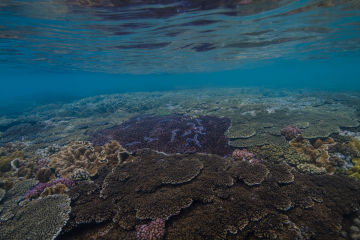Media Release ·
Report confirms Great Barrier Reef has suffered worst summer on record
The Great Barrier Reef has suffered the worst summer on record, enduring cyclones, severe flooding, crown-of-thorns starfish outbreaks and a mass coral bleaching event, an Australian Government report has today confirmed.

The Great Barrier Reef has suffered the worst summer on record, enduring cyclones, severe flooding, crown-of-thorns starfish outbreaks and a mass coral bleaching event, an Australian Government report has today confirmed.
Since December, two tropical cyclones damaged corals as they crossed the Reef, several severe flooding events have impacted the quality of water that flowed to the Reef and crown-of-thorns starfish outbreaks have continued to consume healthy corals. This was followed by one of the most widespread and severe mass coral bleaching events the Reef has seen, which is still unfolding.
While the full extent of the mass bleaching event is not yet known, aerial surveys conducted over 1,000 reefs observed bleaching on 73% of surveyed reefs within the Great Barrier Reef Marine Park and 6% in the Torres Strait. The Reef Summer Snapshot shows the highest levels of coral bleaching were found across the southern region, where temperatures are typically cooler, and parts of the central and northern regions, where in some areas corals were exposed to record levels of heat stress.
The report follows the US National Oceanic and Atmospheric Administration (NOAA)’s announcement this week that the world is experiencing the fourth global mass bleaching event – the second in the last decade.
These extreme conditions are due to the impacts of climate change and underscore the urgent need for immediate action to protect our planet’s irreplaceable coral reef ecosystems, including our Great Barrier Reef.
Coral reefs are vital marine ecosystems that support a quarter of all marine life and provide critical services to a billion people worldwide. However, they are under increasing threat from the impacts of climate change such as warming ocean temperatures and more frequent and severe cyclones. Bleached corals are not dead and can recover, but only if stressors, such as high water temperatures and poor water quality, ease and conditions return to normal.
Off the back of months of record-breaking ocean temperatures caused by climate change and the El Nino climate pattern, widespread bleaching events have been documented in both the Northern and Southern Hemispheres of each major ocean basin signalling a global coral bleaching event is underway.
The Florida Keys and the Caribbean suffered their worst coral bleaching on record. On the Great Barrier Reef, Australian Government Reef surveys have found that almost half (46%) of the Reef experienced record levels of heat stress. NOAA’s temperature data indicates that 80% of the Reef was subjected to bleaching-level heat stress in 2024 and this is increasing by approximately 1% per week.
Great Barrier Reef Foundation Managing Director Anna Marsden said: “This week we’ve reached devastating milestones for our Great Barrier Reef and the world’s coral reefs. The confirmation that the Reef has suffered its worst summer on record amidst a fourth global bleaching event underscores what the science has been telling us for some time – coral reefs are on the frontline of climate change. If we do not take immediate action to reduce global emissions and implement effective conservation measures, we risk losing these irreplaceable ecosystems forever.
“The Reef has had a terrible summer and she’s hurting, but she is beautiful, resilient and with our help there is still hope to safeguard her future. The Great Barrier Reef Foundation was formed in 1998 after the first global coral bleaching event and has been working tirelessly since then to develop a critical toolkit to help protect the reefs we have left.
“Walking in step with Traditional Owners and front-line communities, we’ve pioneered solutions to restore lost reefs and help corals adapt to these warming ocean temperatures, alongside reducing other stressors such as poor water quality and crown-of-thorns starfish outbreaks. Now, we’re funding critical actions at a critical time and working together to implement solutions at a scale and pace never before attempted.”
Aboriginal and Torres Strait Islanders along the Reef have been caring for their land and sea Country for millennia, guided by Traditional Knowledge and customs passed down through generations.
Bob Muir, a proud Woppaburra man from the Keppel Islands near Rockhampton in Central Queensland, said the current mass bleaching event is profoundly affecting Traditional Owner Reef communities. “It’s impacting us in a way that is like sorry business,” he said. “Sorry business is when someone dies and the community goes into mourning. So we’ve actually looked at this coral death and coral bleaching as a sorry business in a way – that we’re actually losing our Country with the Reef being affected and dying, it will affect all of us in a lot of different ways, from our culture to our food to everything we do, and even our identity.”
Top image: An example of bleaching during the current mass coral bleaching event on the Great Barrier Reef. Credit: AIMS | Grace Frank.




